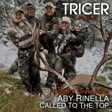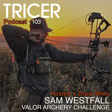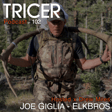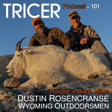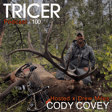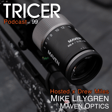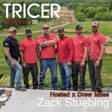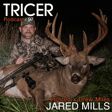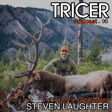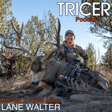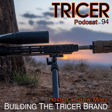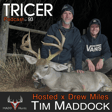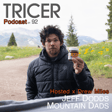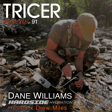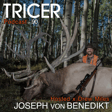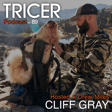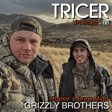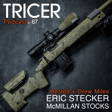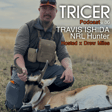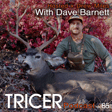Introduction to Tricer Podcast
00:00:01
Speaker
You are listening to the Tricer podcast, where we talk all things hunting, gear, and the great outdoors. Before we begin, let's start things out right and put God first. Lord Jesus, I thank you for Tricer, and I ask that you can use this podcast as a way to bring joy to all of our listeners.
00:00:17
Speaker
We lay Tricer and this podcast at your feet. Amen. All right. I am excited for this one. It's probably going to rub some of you guys wrong, but I'm happy for it.
Hannah Leonard and Sporting Lead Free
00:00:28
Speaker
I have Hannah Leonard from Sporting Lead Free on the podcast today. And what Sporting Lead Free is, is a privately held company that advocates for the use of copper and bismuth and steel shot versus lead.
00:00:42
Speaker
um They are hunters. They're not a bunch of like people just trying to take your gun rights away and your bullets away. They are hunters. Um, just educating the benefits of copper versus lead.
Benefits of Copper Bullets
00:00:54
Speaker
And as somebody who shoots copper for gosh, probably 98% of my animals now, um I was excited to have them on and just talk to them and, you know, hear what they're doing.
00:01:06
Speaker
and hear how they're not trying to take your hunting rights away. They're just trying to educate and, you know, put a shine a better light on the comparable situation that everyone is kind of, I mean, honestly, I think it's where we're going.
Trade Show Experience
00:01:19
Speaker
So Hannah, how are you doing?
00:01:23
Speaker
I'm doing good. i'm I'm getting rested up from a big trade show weekend. So excited to be here. Hopefully my voice stays ah for the duration of the podcast.
00:01:34
Speaker
Yeah, we were both at Western Hunting Expo and Hannah was like two booths over from me. um And we are definitely smoked. i I would rather pack an elk out 10 miles than do what I just did. Because it was I would be less tired than I was from hunting expo. like Everyone in my booth lost their voice. everyone by the By Sunday night, we went to sushi together, my whole team.
Hunting Trips and Plans
00:02:00
Speaker
just smoked i mean you're like you're like almost like saying things don't even know what you're saying anymore you're just you've said the same story 600 times i told the same hunting story right and then with us we have this new bipod that's coming out and like everyone in their mom wanted to be there to see it so i've told the same like bipod hunting stories 60 times you know it just uh yeah it's mind-numbing it really is
00:02:24
Speaker
Yeah, I definitely didn't want to talk to anybody. I was i drove home. I live up in Montana and ah it was a good, quiet seven-hour drive home after that. So it's certainly not for the faint of heart, that's for sure.
00:02:39
Speaker
Yeah, I'm home for three days and then I jump on a plane and fly to... Texas on Friday to do something with Gritty. And then we're going to hunt buffaloes next week. My father-in-law has a buffalo tag or buffalo in, not really tagged in Texas. So we bought a buffalo hunt in Texas. My father-in-law, we're going to go do that. So it'll be fun.
00:02:59
Speaker
i have it on my bucket list. I'd love to hunt a access deer down in, in Texas. That's, that's a goal eventually. We'll see. So what you should do is go hunt access deer in Hawaii with my friend Chase.
00:03:13
Speaker
My friend Chase, on yeah right he owns conservative game management. He runs like pretty much like one of the largest outfitters in the world. So he has like an operation in Baja, California operation in Hawaii and operation in California.
00:03:26
Speaker
um and we went did access to with him last year and it was wild. Wow. I only shot two deer, but if wanted to, we could have shot 30 each. Um, cause it's almost like, yeah yeah, I wasn't really into the whole extermination, like killing deer thing, even though like that's what they want you to do.
00:03:42
Speaker
wasn't really my thing. Just piling a bunch of deer up, uh, even though the meek gets used, but I did shoot two two pretty good bucks. I went over there with Brad hunt from Gritty and it was just an awesome time. We shot some pigs as well.
00:03:54
Speaker
And Hawaii is the way to go for sure on that hunt. Well, can't beat that weather either. Yeah, we're actually going to go live over there, um yeah and my family, for a month on the Big Island.
00:04:08
Speaker
We leave in like three weeks. We leave mid-March, and going to bring my bow, run the podcast from over there, and my wife's going to tie me down so I can't fly away from hawaii I've just been gone literally straight, so we're going stay in Hawaii. I'm going to bow hunt sheep and and pigs this whole time, probably some turkey hunting with my bow, and that's it. Just stay over there. I can't wait to be over there. and The Big Island's like a redneck paradise, so if you like to hunt...
00:04:32
Speaker
and you're not really a big surfer, the big island is where you want to be. It's pretty cool.
00:04:38
Speaker
That's awesome. That's good to know. So now what do you guys do? Tell us about what you're what you're doing. tell about the company, everything.
Mission of Sporting Lead Free
00:04:49
Speaker
Yeah. so Sporting Lead Free, we're a nonprofit organization all about educating hunters and anglers on making the voluntary choice to lead free in the field, whether that's big game hunting,
00:05:01
Speaker
upland hunting, turkey hunting, angling of all sorts, whether you're fly fishing, spin fishing, ice fishing, all of that. So we're all about helping people be aware that there's these awesome alternatives out there to our lead-based sporting pursuits.
00:05:17
Speaker
And I get to travel around all over the United States, educating folks on making the switch, doing shooting demonstrations. I've done fly tying events, anything and everything I can do to get the word out so folks know not only that there are some downsides to using lead, but also the fact that there are some really awesome performance benefits across the board for for lead-free alternatives. So I'm the program director. So I serve in the role of of helping basically form the whole organization's outreach and and education. Our founder is based in Wyoming.
00:05:52
Speaker
And then we also just brought on a new program coordinator, Amanda. She is in California and she gets to help coordinate our ambassador program. So there is only so many people that are so many places I can be.
00:06:04
Speaker
So our ambassadors are a really great group of folks that and they're within their own communities. They're passionate about this and they help us spread the message there. That's awesome. Yes, you can only be so many places at one time. We actually just hired on two more people to fly around and go to shows and hunt for me and do stuff and do shoots and stuff because i have learned that I cannot wrap my hands around this and go to all these things at one time. So we actually, for listening this, Mike Hearn and Alex Millward are now on the Tricer staff working for us full time. So pretty cool.
00:06:36
Speaker
So now did I meet Amanda when I was at, um, when I was at Western Hunt?
00:06:43
Speaker
Yep. She was in the booth with me. and That was her first big trade show with us. So she she definitely got run through the, the I guess, the the way we do those things and how exhausting they can be. But she was really excited to be a part of it. And she's primarily an upland hunter. So she brings a lot of expertise in that that area.
00:07:04
Speaker
So that it was great to have her with me this year. Now, in my mind, i just imagine, like even though I love shooting copper, ah we're going to get into the steel shot thing for birds because you know you're a big bismuth person. I know that.
00:07:18
Speaker
like I have some issues with that. um Even though I really enjoy shooting copper and I use it all across the West, not just in California, I feel like every organization that's like pushing this is just a bunch of liberals that hate hunters.
00:07:31
Speaker
But talking to you guys, I was like, wow, what are you hunt? What? Like, I just thought you were going to be like, went to Berkeley and you were just out here like save the condor, screw you hunters. Like what, how, how did this get started? Who started it? What's going on here?
Founding of Sporting Lead Free
00:07:44
Speaker
Yeah. Yeah. Yeah, I love that because that is definitely something a lot of people initially think about us. So I'm really happy to kind of squash that and and be able to to make sure people know that hunters actually do care about this. So we were founded by Brian Bedrosian and he by day is a raptor biologist in Wyoming.
00:08:05
Speaker
And he came across all of this, you know, all the research was being done in California on the California condors. And when he was doing his master's project, initially it started with ravens and he was like, Hey, I wonder, you know, ravens also feed on gut piles. I wonder if they're getting lead exposure.
00:08:22
Speaker
So initially he did a bunch of studies on ravens and, and basically spoke about ravens getting exposed, but nobody really cared about ravens. um They're like, yeah, they're, you know, just out there being ravens. No one really cares about them. And he was like, man, I got to find a ah different species that people really care about when, when getting exposed to lead. So his next option in there was, was eagles, both golden and bald eagles. So he actually did bunch of studies on the national elk refuge there in Jackson hole, where he captured golden and bald eagles, tested their blood lead levels.
00:08:55
Speaker
And then the following year he handed out lead free ammunition and it was almost a one to one ratio of the hunters who were successful with lead free ammunition. there was a drop, that percentage drop also in blood lead levels in eagles.
00:09:10
Speaker
So he himself, he's an elk hunter as well. So he was like, wow, this is super cool. This research is is obvious that hunters making the switch voluntarily could make a big difference. So as a scientist, he published the data he was like, cool.
00:09:25
Speaker
The management factors, you know management teams, they'll figure this out moving on. Fast forward 10 years, we're still talking about this. It's still a contentious issue. And he saw that his data was being used for people proposing bans on lead. And he was like, no, no, no, that's not the way this needs to go.
00:09:44
Speaker
Bans are really complicated in the sporting communities. They they don't work. Hunters and anglers just need to be educated and they can make that voluntary switch on their own. So that's when he started Sporting Lead Free and and brought me on. I have a different, unique story as far as lead goes.
Hannah's Lead-Free Journey
00:10:01
Speaker
um But anyway, thats that's kind of how we started was Brian doing the research, seeing it being used. You know, we always say, you know, and and my background is it in marketing initially, and we always would say using the dark arts for good. So he saw his research being used for bad. So he was like, hey, I got to fix this. We got to we got to make sure that people know that hunters actually care about this issue and can make a huge difference in exposure of of lead poisoned eagles out there from our hunting and angling activities.
00:10:31
Speaker
Yeah, I really like that approach, right? Because as somebody who chooses to use copper, i have a lot of friends are using copper now just because I have five kids. I don't want my kids. Like if I shoot a burger into an animal, like it's just lead everywhere.
00:10:43
Speaker
if i should have bur Especially some the everyone's shooting these match bullets, right? um And I've just never had an issue with copper. Like, I really haven't had... i can't say that. I did have an issue with shooting a 6.5 PRC in Hawaii this year with a certain bullet that i never shoot.
00:10:58
Speaker
And I was just penciling deer. So that was... The velocities were too high, too close a range, and the bullets didn't expand. Now, if I was using a hammer bullet or a Barnes, have had those problems because I've never had those issues with those bullets. It was just...
00:11:09
Speaker
a certain situation that I didn't really enjoy those bolts. um but it have been the same thing if have been using ELDM or anything that was close ranges, shooting a deer at a hundred yards with a 65 PRC going 3,300 feet per second, you're going to have issues.
00:11:22
Speaker
But yeah one thing I don't like is being like, and I think from a hunting standpoint, like the majority of hunters are conservatives, right? And whether that, one thing we don't like is having the government tell us what to do.
00:11:37
Speaker
right? Like, I don't want you tell, like, when you tell me what to do, i really want to use the other thing just because, like, you're telling me what to do That's kind of, i think it's kind of like ah This like ah it's a a character trait of conservatives. Like we don't want like, no, we can manage these things, right? Like we've been managing like same thing in Colorado this year. Like the government wanted to come in and say, hey you can't hunt lions. but it's like, wait well, we've been managing these forever. We love lions. We don't hate lions.
00:11:59
Speaker
um There's these certain groups who want to take what we would consider our rights away, right? When it comes to lead. And like California did that. California said no more lead across the state. You have to use copper. And that rubbed people the wrong way. But I think the way the approach you're having with education is such a better approach.
00:12:16
Speaker
um I do think you're going to see lead and hunting kind of go away over time, whether it be a government stepping in or not. But it's not a scary thing to me because I've just, I mean, I couldn't even tell you how many big game hails I've shot in 50. I have no idea.
Copper Bullets in Africa
00:12:30
Speaker
Between me and my kids, my father-in-law is just friends. Like ah the majority of us shoot copper now and they just work, right? Yeah.
00:12:40
Speaker
I mean, the whole initially when copper bullets came out in the 80s, barns were they were the first on the landscape with the the fully copper bullet. It was because it was an accurate bullet. It wasn't because of, you know, saving unintentional non-target wildlife species. It was because they wanted a bullet that performed.
00:13:00
Speaker
and performed consistently and really had some, some devastating, really lethal outputs. And so having people, you know, we have different reasons why people make the switch, you know, whether it be like you said, because your family, i don't want to eat lead.
00:13:15
Speaker
I've had an experience of eating, you know, lasagna made with an axis deer that, unfortunately had been shot with lead and thought it was fine and I'm chewing it and I pulled a lead fragment out and i was like, wow, that is wild of all people to experience almost swallowing lead being the gal who does this for a living. But, you know, I don't have kids, but I like to share my meat with families. And so I want to make sure that, you know I'm sharing doesn't have any lead in it. So whether people are switching for that reason, whether they're switching because of the performance benefits to it, to that, there's less meat loss, there's more weight retention, there's
00:13:50
Speaker
there's amazing benefits to switching or if they're switching because they don't want to impact non-target species like eagles. Whatever the reason, we're happy to help you make the switch. And and speaking on the the point of California, you know, they had good intentions with the ban, right? They wanted to limit the exposure of condors to feeding on gut piles that contained lead.
00:14:11
Speaker
but they didn't go about it in a way that they educated the public on why and how. So it's so important. I speak to a lot of California hunters and and I ask them, I say, Hey, you know, when you're being told you have to switch to all lead free alternative, do you know why? They're like, no, the government just told me. it's like, all right, let's rewind it back. I'm going to give you some, some reasons why. And then they're like, oh, I tried it and it failed or I did this and it didn't work. And then my buddy, my buddy, Jim, my buddy, Jim shot a deer. it went right through it. It didn't even, it didn't, just didn't, it looked like a full metal jacket. Trust me. I know owned the forums.
00:14:48
Speaker
Oh, yeah. Yeah. Well, and a lot of it, too, is people just don't know how to how to use the tool. Right. You know, if if I hand you, you know, a new finagle technology technology device, I don't tell you how to use it or the way to use it. You're going to have some some hiccups with it. That's just inherent. So people don't realize that there are some nuances when you're switching from a lead projectile to a monolithic projectile.
00:15:11
Speaker
And so that's where we come in. We're trying to fill that gap in education and helping people not only understand why they're making this switch, but also how to do it and to be the most successful in doing that.
00:15:24
Speaker
Yeah. And honestly, there's a few things like I want to, we'll get into some stuff. Let's go this way first. So I have to shoot copper when I hunt, but i don't have to shoot copper when I go to shoot.
00:15:39
Speaker
and I shoot a couple thousand rounds a year into dirt in California. Why?
00:15:47
Speaker
why Why is that? You're asking me why? Yeah, why do i why can't i shoot why can't I shoot lead at targets, but I can't shoot it at animals? And i shoot you I shot, I think, seven rounds this year at my deer total, copper, but I probably shot, you know, I don't know, 3,000 rounds of lead this year into the dirt all over Southern California.
00:16:09
Speaker
Yeah. So a lot of that goes into when it's entering the food web. So in California, the reason it was banned is because California condors were feeding on gut piles that had lead ammunition in them.
00:16:21
Speaker
It was a lot of people say, no, that's not the case. There is, there's studies out there that actually matches isotopically the lead that these condors were ingesting to lead coming from ammunition manufacturers and ammunition factories. So that's the reason why When we're out there hunting animals, we in California, you have to make the switch.
00:16:42
Speaker
The reason it's okay to still shoot them at ranges is because most shooting ranges have a lead mitigation plan in place. And what that means is every 10, 15, 20 years, they're supposed to scoop up all those berms.
00:16:54
Speaker
Or if you're at a trap range, you know, scoop up all that surface layer and they sift out the lead. They send it out to get remelted. A lot of that gets sold to car battery manufacturers. A lot of it gets sold back into the ammunition manufacturing industry. So that that is a place where where it's okay to shoot lead because it's it's in a controlled environment. It's not going out and entering the food web.
00:17:19
Speaker
There are arguments, of course, of people saying, oh, game birds can come and you know feed on specially spent shot at those. shooting ranges, you know, there's, there's a lot of, again, there's a lot of like nitty gritty things we can go down. But, but for us, we also say that at at Sporting Lead Free, we say we're not anti-lead, we're just pro-lead free. I still shoot lead at the range when I'm getting used to a new firearm. It's a lot cheaper. I want to get something.
00:17:44
Speaker
Yep. it It can be, it definitely for, for if you're just a target shooter, it's a lot cheaper. um I shoot trap on weekends. I'm shooting lead. I know that it's, I know the ranges I go to have these mitigation plans in place. So the lead isn't just sitting in that soil for eternity.
00:18:02
Speaker
But I also know that when I'm going to go out in the field and I'm going to take an animal that I'm going to consume, then I'm switching to a lead free alternative. Yeah. And my father-in-law would tell you, he's a like ah like a world renowned geologist.
00:18:15
Speaker
He would tell you that once Once lead hits like air and gets into the dirt, it's going to oxidize anyways. And it's just like another mineral in the dirt. So what's the big deal?
00:18:27
Speaker
A lot of that comes from if the soil is really acidic. So like if I hold a lead pellet in my hand, I might get like a little bit of surface absorption, but as soon as that hits an acid, so whether that's acidic soil or an acidic stomach acid, that's when it starts to break down and become much more readily absorbed.
00:18:44
Speaker
So It really, there's so much, I know I hate the answer, it depends, but it really depends on that soil composition. it depends on, you know, if there's a lot of heavy rain and that runoff, you know, and it gets into a waterway that's more acidic, like a marshland.
00:19:00
Speaker
So there's so much that it depends on. But for for the case of, you know, where should I shoot my lead, typically a range is an awesome spot for that. Okay.
00:19:12
Speaker
I like that. I do shoot my lead in the hills though too, but I think that maybe in that situation that you're not loading so much of it up, it sounds like maybe that's why it's not frowned upon because you're shooting. Like i I'll go shoot steel targets in the desert, shoot the target that explodes because copper sucks at shooting steel targets. You can't see your impacts, right? You're trying to get impacts at 800 yards. You can't see it.
00:19:32
Speaker
Um, it does explode. That goes everywhere in the desert. Um, but is that not such a big deal? Cause we're not worried about like a condor flying down then and picking those things that we're worried about more is if I shoot a jackrabbit at a thousand yards and may or may not pick jackrabbit. It's up I shoot him a thousand yards.
00:19:49
Speaker
Then the condor comes in, eats that thing full of lead because you're shooting a target, ah ah like a match bolt out of the thing, spluttered inside of it. Condor eats that. How much lead can it, I mean, is it like one jackrabbit and condors dying or what's what's the big deal with these condors?
00:20:04
Speaker
Yeah. So yeah, I can speak more closely with eagles because that's kind of our focus being based in Wyoming, but condors are more sensitive. So you can take this information with that as well. So it's also individual dependent. So just like humans, like I could smoke a pack of cigarettes a day and never get lung cancer.
00:20:21
Speaker
An ultra marathon athlete could never smoke a cigarette ever and they could die from lung cancer. So it's also dependent within individuals, but there are certain species like eagles and condors, which are much more impacted from
Impact of Lead on Wildlife
00:20:34
Speaker
consuming lead. So in the In the space of eagles, I'll talk about that.
00:20:38
Speaker
All it takes, if they consume 20 milligrams of lead, which I know, it's like, what does that look like? It's about like a half of a grain of rice or the weight of a ladybug. That is enough that could kill them if that gets fully assimilated into their bloodstream. So 180 ELDM has 10 grains of rice in it, get dumped in the animal, 100%.
00:21:01
Speaker
At least 10 grains of rice get dumped in there. Yeah. okay Yeah. So you can see too, there's been a bunch of studies done. There's one particularly in Wyoming where they they shot a bunch of white-tailed deer. They x-rayed the entire carcass and then they gutted it and then they x-rayed the guts.
00:21:18
Speaker
And on average for a white-tailed deer, there was about 160 fragments left in the gut pile. And those, I want to also note that those are visible fragments. So some poor student had to sit there and look at these x-rays and like count all of the visible fragments.
00:21:32
Speaker
There's new studies out there now too, that they're actually seeing thousands of fragments because of that really fine dust particulate that especially in our like bonded bullets that they don't fragment these big chunks, but they fragment these little dust particulates.
00:21:45
Speaker
Those are actually way more dangerous to our non-target species, our scavenging species, because that's so much more easily absorbed into their bodies. So it really doesn't take a lot of lead to kill an eagle, to kill a condor and if we can leave those gut piles clean, you know, why not? Again, like our whole thing too, it's sporting lead free is, is we are hunters and we want to preserve our hunting heritage.
00:22:09
Speaker
If the wrong group gets it in their head that we're out here killing eagles and condors, and we're bringing lead home to our kiddos, that's a bad day for hunting. And we don't want that. We don't need any more bad press. So I think we need to clarify, cause you keep saying gut pile.
00:22:24
Speaker
You also mean lungs, et cetera. Because like, this doesn't mean that guys, if you guys are a great shot and shoot it through both shoulders, that you you did your part. Because shoot it through both shoulders, it's going hit both those lungs.
00:22:36
Speaker
And I don't know anybody taking the lungs home. And that's pretty much what's full of the letters of the lungs. And these animals are eating those lungs. And that's what you mean by gut pilot, right? Is internal organs, not just the guts. Yes.
00:22:47
Speaker
Yeah, anything you live in leave in the field. So I happen to love bringing a lot of the different parts of the gut pile home because I make treats for my dogs and I'm just that weirdo that tries to use as much as the animals. My wife is all about the liver right now and making these like little pills. So all the crunchy at church, I'm just bringing home deer liver after deer liver for all the women to like freeze and make pills out of. Trust me, i know all about it, Hannah.
00:23:13
Speaker
Oh yeah. So, but what we're talking about, yeah, we're talking about gut piles. It's, it's anything you late leave in the field. So what a lot of folks also don't realize, cause we, when we go to the range, we're shooting paper, we're shooting steel.
00:23:25
Speaker
What we have at our, at our display, what you were able to see at Hunt Expo is we have these ballistic shells and we have these epoxy casts. So the ballistic shells show you your trajectory, your bullet trajectory through the bullet that or through the the cavity of the animal.
00:23:38
Speaker
And those fragments can travel up to 18 inches from that initial point of impact. A lot of people will argue that that's helping take down the animal. For the most part, if those fragments are so small, at that point, it's just damaging your meat. If they're bigger fragments or bigger petals, sure, that's creating an additional wean channel.
00:23:55
Speaker
However, that's also going into parts that you're either leaving in the field or you're bringing home to your family. So that's something that, you know, we really like to talk about with folks because a lot of times having that visual aid, I can say it as much as it as you want, but seeing it is believing it.
00:24:12
Speaker
We'll do shooting demonstrations with people and they'll butll be like, nah, this bullet. I had a buddy who was shooting the ELDX bullets. He's like, nah, this doesn't fragment. I was like, awesome. I would love to see a lead bullet that doesn't fragment. We shot it into the water trap. He was like, I think you had lead fragments in there just waiting for me. was like, cool. Let's shoot it into a ballistic shell. show you. It's all clear and great now. And then I'll shoot it. And he shot it and he was like...
00:24:34
Speaker
Okay. Yeah, you're right. That one did fragment. So um really any bullet that has lead in it will fragment. It's just the amount it fragments can vary between bullets.
00:24:47
Speaker
Yeah, exactly. And i mean, if I want to be totally transparent, me and probably most hunters out there, when you have, let's say you do shoot an ELDX or a Berger through a shoulder, It blows out that back shoulder. You're cutting that bloodshot meat out where all the lead is and throwing it on the ground anyways before you pack it out, right? Like I want to get something to allow of that bloodshot off in the field. So I'm just cutting that out and throwing it away.
00:25:06
Speaker
I can tell you we did shoot some Kuzi with burgers in Mexico this year on a 30-nosler. And there's definitely some lead meat. We put... ah Whatever, I'll tell story.
00:25:17
Speaker
My partner shot his first coos deer, shoots it through the lungs, perfect, right behind the shoulder, boom, blows him out. I mean, like on video, you can see the blood spur everywhere. It's wild. He's so excited. His first buck, buck turns around, he shoots this buck through the back strap into the spine and drops the buck where it stands.
00:25:35
Speaker
We got down there and there was meat from that buck 10 feet up in the air in a tree. The next day it was gone. And now I'm thinking about it I'm like, dude, I just killed so many birds in Mexico by letting him do that.
00:25:46
Speaker
um and And like, honestly, as somebody who loves nature, like, I'm like, oh, i feel kind of bad about that. Like I'm looking at it now. I'm like, wow, we probably killed some animals that we shouldn't have done. ah And I was shooting copper and actually like Ben did a monster in copper. lot of are shooting copper on this hunt.
00:26:02
Speaker
But followed by his Nosler and I'm looking I'm like, man, like he just drew an elk tag in Arizona. So my father-in-law, And I think I'm going to have switch over to the hammers just after seeing, having that experience with that gun.
00:26:14
Speaker
Like, hey, we should probably shoot the hammers when we go to Arizona because I don't want you to like fill this elk full of lead. Like just seeing what that bullet did like on that deer, it's doing the same thing in an elk, but it's just not as explosive as doing it all inside of it.
00:26:29
Speaker
So lead is, I mean, copper is a better way for him to go. And he does shoot copper in most of his guns. Um, it was just this time we already had the, the hamburgers, the burgers were loaded up. They're ready to go. And I was like, we don't have time to redo this. I'm gone too much to shoot the burgers.
00:26:43
Speaker
And I could definitely see how we definitely poisoned a bunch of birds in Mexico last week. Yeah. And that's another thing too. Like, Burger bullets, all all bullets are awesome, right? All bullets get the job done. I mean, I'm sure there's some so out there that people don't love, right? But we always say there's no dead or dead.
00:27:00
Speaker
You know, they work. So there's no question about the effectiveness there. But it's it's really all about, you know, thinking beyond the bullet, thinking not only, you know, what you're leaving on the landscape, but also what you're bringing home. And and there a lot of folks there say, oh, I don't want to switch to copper because I want that big, you know, expansion. I want those, you know, fragments coming off.
00:27:21
Speaker
There are amazing copper manufacturers out there that that make bullets that are intended to pedal off. Just like you were saying, hammer bullets, that's a great example. um Cutting edge, they make a great bullet that pedals off as well. So if you if you want more of that pedaling off, that kind of explosive nature, there's amazing copper alternatives out there. and And copper is not toxic like lead is. So if an eagle or another animal eats, you know, a big chunk of copper, either they're going to regurgitate it because their, their body's going to treat it like bone or or fur that they regurgitate anyway, or it just passes through them.
00:27:57
Speaker
Um, and it's not going to have those, those lethal consequences that lead will.
00:28:04
Speaker
Yeah. And honestly, like we should talk about the effectiveness of copper and and why I personally choose to shoot it. And I choose to shoot it out of state as well. Um, for one, I find I get way less meat damage. Um,
00:28:17
Speaker
I can shoot through the shoulder and not worry about blowing the thing apart. Honestly, like I shot a buck last week, or I it'd be two weeks ago in Mexico through bow shoulders, 300 yards. And that buck dropped in his tracks. Bam, right there. One 30 out six.
00:28:31
Speaker
The bullets ripping out that I'm shooting like 31 60 velocity. Even there's going fast. Hit that deer, probably going 2,900 feet per second. And that buck dropped in his tracks. And every animal I shot with it this year, it dropped in his tracks.
00:28:43
Speaker
but I didn't leave lead all throughout it. um They're phenomenal. I know I talked to a lot of guys from Africa when i was down there and they were like, we will not let you shoot lead in Africa. Um, because we only let you shoot barns. Like we only, like they were saying, we only let shoot barns, ETS actually in Africa, right. Or hammers or some of the horny stuff.
00:29:00
Speaker
And the reason is, is they want to get that full penetration all the way through. Like you'll see a lot of guys like, um, like Brady Miller. There's a lot of people in the industry. I think Rinella too. And Giannis, I mean like there's a lot of very known people the industry who are shooting copper. Now I actually shouldn't speak for Rinella and Giannis, but I think, I think Giannis is shooting copper now.
00:29:19
Speaker
Um, Yeah, so they partnered with Federal and their whole Federal and Premium Trophy Copper. It's all branded. and And Federal, they load TSX Barnes.
00:29:31
Speaker
It's all branded meat eater. and So that's something that they co-branded with them. So I would hope that they're always using it, but also I can't speak of it either. I think they are. At least they support it.
00:29:42
Speaker
I think they are, and I know they do shoot copper a lot um because they're feeding their families, right? You just don't want to fill your kid. And that's one of the biggest things I get from my friends is like, I just don't want to give my kids a bunch of copper, a bunch of lead. I'm sorry. And um you get that full penetration. It's one thing I love about the barns is you get that full pass-through penetration. My boys and my partners all shoot the 168 TTSXs. They all shoot the same load in And they've killed animals up to 400 something yards with full pass throughs, right? Like my, my kid shot a giant mule deer this year. mean, thing was 250 pounds. I don't know what it was giant.
00:30:17
Speaker
Um, I shouldn't speak weights, but it was big. It was one of the biggest year ever 384 yards, full pass through both shots. Um, First shot, he was dead on his feet. He shot him one more time, just put him down. because Sometimes some animals are tougher than other animals, right? It was a little far back, but the other one into him, dropped him on it right in his tracks.
00:30:33
Speaker
And I actually really prefer that high shoulder shot for animals not running. on deer, on elk, I do tend to want to go behind the shoulder no matter what, cause you're just going to get, i mean, they're just such tough animals, but you can put that barns right through the shoulder on an elk and it's going to break that shoulder, that scapula.
00:30:50
Speaker
It's going to fully penetrate. And lot of times if I do that shot, i'm going to have a bolt in the offside shoulder of, I won't get full pass through, but, um, that's any bullet though. I mean, if you did that with the ELDX, I'm going to make it to the other shoulder. It's going up inside of them.
00:31:02
Speaker
So it's a very effective way to kill animals. And, the barns are phenomenal and i've shot barns forever i shot the lrxs i shot a lot stuff with six five i've killed elk with a six five i've shot a lot of the one eighty s and 168 eld exit or that i'm sorry the ttsxs and now i've kind of switched over i go back and forwards i work with both barns hammer they both put on the podcast talk about it um And I shoot the hammers and the barns in my guns. And the hammers, like Stephen Hammer, he literally created this bullet not because he was like some hippie condor saver. He just wanted to not have lead in his meat and he wanted to effectively kill animals.
00:31:42
Speaker
Right? And he created a bullet that just... is lethal on animals. It just works better than the lead bolts I've shot. and And I know if I put a hammer into an animal, I mean, when I do it right, it looks like a cat's paw at the other side. Right. So I get this like baseball size cat's paw, not, not an exploded hole, like with a burger, but I get this crazy terminal performance where I'm getting the big slug through the middle and then the three pedals come off and they take it out, you know, and it just, it just wreaks havoc.
00:32:13
Speaker
Yeah, there there are so many awesome benefits to lead free that that I think once people try it they really they'll see see the difference. and And most every major manufacturer has a lead free bullet option out there on the
Selecting Lead-Free Ammunition
00:32:28
Speaker
market. So it's really all about, that's part of what I do too, is help people find it in either their local retail stores or if you live somewhere where you can buy it online.
00:32:37
Speaker
it's It's really kind of, I always akin it to when you go to the grocery store and you see the wall of of cracker flavors and you're like, Oh, I'll just grab one off the shelf. And then you get home and you're like, Oh, I got the rosemary olive oil and I meant to get cracked pepper or whatever. It can be very similar when you go into a shop and you see all these different manufacturers and and you want to, you want to do, you know, pick the lead free one, but maybe you're not familiar with, you know, the name of that specific bullet. Cause everybody has a specific name for their lead free bullet. They're not all the same.
00:33:08
Speaker
Not everybody has the same symbol that tells you it's lead free. So, Again, being that informed consumer and knowing and also trying different brands. Like I have guns that shoot certain brands really well and other brands not so well.
00:33:21
Speaker
So it's all about, you know, people ask me, oh, it's the best brand to shoot out of my rifle when I make the switch. I say, whatever one your rifle shoots the best, that's the one you want to go for. Yeah.
00:33:32
Speaker
And honestly, all of these bullets now, the cool thing is they're specifically made for killing animals. And like my favorite thing about a copper bullet is that blood trail, right? Like in the argument would be, well, if you shot a burger, you wouldn't have a blood trail because you'd die right there.
00:33:47
Speaker
Yeah. If you shoot them a little bit farther back, you're not going to have that problem. Like I've had my father-in-law shot an elk with the burger and it blew the shoulder up and now it got away. It didn't penetrate.
00:33:59
Speaker
And like don't get me wrong. Like if burgers listening this, I love your bullets, right? I hung out with the guy this weekend. I shoot your bullets at my matches. I love it. I just don't think it's a hunting bullet. Right. And then there's this big push right now.
00:34:12
Speaker
And this is going to piss some guys off over on rock slide. I know to go to like a small, like a Sierra tip match King, the TMKs. Right. And they're shooting these 80 grand TMKs. Cause it's an exploding bullet. And you, you know, it's just, you can shoot a tiny bullet. does the trick, but man, like you're just,
00:34:30
Speaker
For one, I think you're asking for it because the marginal shot, you're going have problems. And for two, you're not getting that full penetration, right? And I just, you could do the same thing with a nice heavy copper bowl. It's going to get in there, kill that animal effectively.
00:34:43
Speaker
And yes, I can say that a lot of times I shoot an animal, like I shot an animal end to end this year, an antelope, and it ran 75 yards. It was dead on its feet. I cut of thing apart where it was with a hammer.
00:34:55
Speaker
And possibly if I hadn't used a burger, it probably would drop right there because have just freaking wrecked shop on lungs, everything, just dumped them. But the animal died. And I feel like I just, I've never had an issue with a burger or with a Barnes killing animal.
00:35:09
Speaker
They just work, right? I'm actually texting the the guy from Barnes is texting me as we're talking right now. we're gonna I'm trying to get him to sponsor this this match we're doing in Africa and have him be the Barnes the sponsor for it because I just know when I'm shooting a hard-shouldered animal, if I'm going to go to Alaska, which I will go to Alaska at some point,
00:35:26
Speaker
for moose, 100% shooting a Barnes.
Success Stories with Copper Bullets
00:35:29
Speaker
Honestly, it would probably be over a hammer I'll shoot a Barnes because I want to stay together and go all the way through. And even though I know like Steve's going to hate hearing this, or either if you heard this part, i just feel like a Barnes would to be the most effective bullet for a moose because you can get that full pass through and you're going to get that blood that you need. the Yeah. all All the animals I've shot, and I've shot all of them with copper,
00:35:52
Speaker
they've dropped on the spot. I think this year, my whitetail, he ran maybe, maybe 60 yards. And I was, i panicked because it was the first time I've shot offhand. I was leaning ah you know on the, on a tree.
00:36:07
Speaker
I had this ex that would always yell at me be like, you see the does running, you got to get ready. And I'm like, I'm not shooting an animal that's running. I'm not ready for that. And then this year I see these, these three does running and I'm like,
00:36:18
Speaker
oh man, I got to get ready for this shot. And so, you know, I knew the buck was chasing him. And so I lean against this tree and I, you know, make a little bleat so that the buck stops. And then I shot him and then he ran a little bit and was like, oh man, that was, that was a dumb decision. I shouldn't have done that. know, it was the last day of the season. But then as soon as I get up to him, he was, he was dead before he, you know, even knew it. He was dead on his feet. He was dead on his feet.
00:36:45
Speaker
yeah especially run idea I shot my elk. Yep. I shot my elk this year at 362 yards and she, she dropped, she didn't even know it was coming. So, I mean, I, the reason I'm, I made the switch, I guess I can tell that story too, if you want to hear it, but yeah, I was hunting. and I'm an adult onset hunter. I didn't start hunting until graduate school and I did it because I wanted to bring meat home to my family, to my myself. And I didn't want to rely on, on somebody else to do that.
00:37:14
Speaker
um I was diagnosed with Crohn's disease when I was 12 and for whatever reason beef products can can make me not feel super awesome. So I was introduced to game meat and that didn't make me sick. And I was like man, I got figure out how to do this on my own.
00:37:28
Speaker
So anyway, fast forward, i'm I'm in grad school and I'm hunting on a block management area in Montana. And I come across a golden eagle that was on the ground and it it wasn't dead, but it certainly was not well, you know, and I'm not an eagle biologist. My background was in marketing and I got my master's in resource conservation, but I knew enough about animals that this one was not going to survive if I didn't do something about it. So luckily I knew that the local raptor rehab facility called them up.
00:37:55
Speaker
They said, Oh yeah, just throw your hunting jacket over it bring it on. And I was like, Oh man, that's just casually throw a, you know, it's not a parakeet out here, but, uh, did that. and And at the time, you know, it's, it's wings were drooping, its talons were clenched. I just had assumed it got electrocuted. There was all these power lines up ah above me.
00:38:15
Speaker
And so being an animal lover, when I dropped it off, I said, hey, call me later and let me know you know how this eagle is doing. This is awesome experience I never thought I'd have. but Anyway, so she calls me later. She goes, yeah, that this eagle has lead poisoning. I said, what are you talking about? The eagle's not you you know chewing on old barn paint or huffing old tractor gasoline.
00:38:35
Speaker
She's like, no, no, no, it's in gut piles. And she explained the whole thing to me. And I was like, oh, my God, I have to quit hunting. This is like the worst. I can't believe I'm out here doing this. This awful. She's like, no, no, no.
00:38:45
Speaker
We need hunters on the landscape because these gut piles that hunters provide Hunting usually is the same time that the eagle migration is. So it gives them such an awesome free meal to eat on the landscape.
00:38:57
Speaker
So she's like, we we need you out there as hunters providing this resource for these animals. However, just make the switch to lead free. So I went home and I started Googling everything, figured out what this lead free business was about and immediately switched over and recited my rifle in the next day to a lead free bullet.
00:39:15
Speaker
And then a researcher up here in Montana, Mike McTee, he heard about my story. We wrote an op-ed into our local newspaper. Finally, when I finished grad school, I was that student. I was like, please, anyone hire me to do anything. implore help. and ah Mike had been friends with Brian, who who had just been begun starting this sporting lead-free process. and He was like, hey, would you want to do outreach for this organization? I was like, heck yeah.
00:39:39
Speaker
I've already been that weird girl trying to you know transition all my other hunting buddies into switching to lead-free, so might as well do it for a living and Here I am four years later still doing it. So one day I hope I don't have a job. One day I hope everyone knows about it and it's old news and I have to figure out some other career. But for now, it's a pretty awesome job.
00:40:00
Speaker
Yeah, that's actually a pretty impactful story. And I can say the vast majority of hunters I know would be really bummed out if they found a bald eagle that was dying from something they shot. They'd be like, dang, that sucks.
00:40:11
Speaker
And like that alone is like, I don't want to see that. like I am not, like don't call me a hippie liberal. Yeah. It's an animal. We love animals. Like, I don't know any hunters who don't, like honest few hundred who just wants to go out and shoot freaking eagles. Like you're an asshole. I don't want to hunt with you.
00:40:25
Speaker
know what i mean? Like you're out there just like, like, I don't know. Like that's just a beautiful bird, especially like our country's bird. Right. And we're killing them. So totally I, it does like, i I mean, if people listen to this and they're like, oh you're, you're soft. Like, no, I'm not like, I really do love animals. Like I love wolves.
00:40:42
Speaker
I love cougars. I love brown bears. We should be able to hunt them. I want to hunt all three of them. yeah You know what I mean? Like California band lions here in California. doesn't mean that I don't think they're awesome when I see them.
00:40:53
Speaker
Like when I see them, like I saw four lines this year. Like, I think it's awesome to see them. Yes. i would love the opportunity to be able to hunt them and manage that species, but I don't want to just like flagrantly be like poisoning lions having them, you know, die off. Like, it's just not who I am. Like, it's just, I do want to manage them. You know what i mean? And so, yeah, I think that's awesome. Um, I think, I think it's too, like being, being an adult onset hunter, you know, I didn't grow up in a hunting family.
00:41:21
Speaker
And I grew up in an outdoors family and my parents were kayakers, mountain bikers, rock climbers, that kind of side of things. And it wasn't until I started hunting that I realized that I didn't know anything about the environment that I was, you know, recreating in.
00:41:37
Speaker
And hunters really do have such an awesome and unique perspective on our wildlife, on our landscape, on our public lands, that I think the non-hunting public would be remiss to not just listen and and understand a lot of what, what we have to say. You know, I, my hunting buddies know, know more about, you know, the animal behavior than, than a lot of people who, you know, proclaim to be, you know, animal lovers kind of thing. And so it's, it's really been cool to be, become a part of this community and really go in full in and, and start really respecting and understanding it in a very different way than, than I thought I had before. You know, I thought I had that respect and that understanding before, but,
00:42:19
Speaker
one of those things, you know, the more you know, the less you know, you know no um you know, learning that and and being able to appreciate that has been been awesome. And and honestly, a lot of have a lot of contentious conversations with people. Right. This is a contentious issue. And and the most intense conversation I've had is with someone that was more on the but environmental side and really upset that we weren't pro band.
00:42:43
Speaker
And, you know, after talking with that gentleman for a little bit, he he totally understood that position. And he went to his his legislators in his state who were proposing a lead ban in in their state. and he said, hey, we actually don't really understand this. And we need to take a step and and understand why we shouldn't have a ban and why we should go this education route. So that's been really cool. that's That's the most rewarding part of the job is having people come up really hot and bothered and then leave being curious and wanting to learn more.
00:43:12
Speaker
Oh, people hate copper.
Challenges with Steel Shot
00:43:14
Speaker
Like, I get people pissed off. When I say what I shoot, man especially this year, I'm shooting.30-06 with copper bullets. Oh, man. you It is like I am like the anti-hunter for some reason now versus this new modern, you know, fan-angled six, you know, whatever PRC with a small, tiny bullet that blows up.
00:43:32
Speaker
um All right. So you don't have to sell me on the bullets. Like, I get it. I hunt with them. The proof's in the pudding. Anyone can argue with me all day long. I kill... More animals than most dudes do every year with copper.
00:43:44
Speaker
Hands down, copper bullets work. That's it. This is where I'm pissed off. I told you this, right? hear it. The steel shot thing, right? So we went to steel shot in California. We are lead free for everything, including birds.
00:44:01
Speaker
So I have to shoot number seven steel. I know you're going bismuth at at birds. And man, I wing so many birds because the problem with steel is it just goes straight through And I told you this. I think I told you this.
00:44:14
Speaker
I went to Argentina and killed a pile of birds. And we use these crappy Argentina, like number eight lead shells down there, 20 gauge. We went duck hunting. And I tell you what, I have never seen a duck fall so hard as when I shot it with a crappy Argentina number eight lead, even compared to like these awesome fandangled, you know, black clouds. So we have 30 bucks a box up here.
00:44:37
Speaker
Lead kills birds better. You like, it's just, it just does. It just mushrooms in there and they just drop like a ton of bricks. And now I'm shooting here and I don't, I don't wing shoot as much as I used to, but I did get out and bird hunt probably four or five times this year.
00:44:49
Speaker
Killed it. You know, I killed a pile of animals with, with steel, but man, I'll tell you what, I had a lot of runners on quail. Like I'd shoot quail and it'd just go through them, hit the dirt and they just run. Right. And without a dog, we probably wouldn't have picked up a lot of them. And a lot of them did get away on me.
00:45:03
Speaker
Um, and you do see it with ducks too. You shoot a duck, even with the best stuff out there, it's just not as effective as lead. So that's where I have an issue. Yeah, no. And that you're not alone in that. You know, I get that a lot. People say the lead is dead and you know, that there's a reason that we used lead for a long time. and lead for, for waterfowl hunting has been federally banned since the nineties.
00:45:27
Speaker
We can talk about that, but I'm sure a lot of folks are familiar with that, but for upland hunting, you know, you can still use lead. The one thing again that I'll go to is knowing how to use the tool that you have at hand. So if you're switching from ah lead pellet, a lead number seven, and you just go to switch to a steel number seven, you're going to fail.
00:45:45
Speaker
It's not going to work like experiencing right now still is so much yeah because steel is so much less dense than lead. So lead's density is like 11.2 grams per cubic centimeter or something like that.
00:45:59
Speaker
And steel is like 9.8. So you're, or no steel is like, You'll have to fact check me on that. It's much less. So in order to have similar performance, if you're switching to steel, you have to go up in pellet size, at least two sizes. So if you're shooting lead number seven, you're going to go up to a steel number five at least.
00:46:18
Speaker
Now on quail, quail is a number five. Yep. Yep. That's pretty standard across the board. I'm going to blow my quail apart number fives.
00:46:29
Speaker
you're quit Yeah. So that's where, that's where i was getting at. You know, with quail, I would probably encourage you to switch to bismuth. Bismuth is still less dense than lead, but it's, it's more dense than steel and it's just about as soft as lead. So it behaves a lot more similarly. You still with bismuth, you need to go up one size. So again, if you're shooting shooting lead sevens, go to a bismuth six.
00:46:51
Speaker
That's going to be probably a much better material for you to use on quail. So, you know, steel was the alternative and it was primarily for duck hunting. And so, you know, switching that into the uplands, there's again, going to be some nuance there, but our, our favorite company, one of our conservation partners is Boss, B-O-S-S.
00:47:11
Speaker
They make the only copper plated bismuth shell out on the market and their stuff drops. So Brandon, who's the founder of that company, he's ah a tried and true duck hunter. And when that ban happened in the nineties, they were like,
00:47:25
Speaker
This steel stuff sucks. We're crippling birds. It's not cool. We don't want that. So that's where he came to the board and they designed a copper plated bismuth. And they're the only ones on the market that have the patent to copper plate bismuth. You'll see like copper plated being advertised.
00:47:40
Speaker
If it's not boss, it's copper plated lead or copper plated steel. So therere their stuff drops birds. You only you know have to go up one shot size. There's also tungsten.
00:47:52
Speaker
I would save that for your turkeys because tungsten is really expensive. There is something too we didn't mention. There is cost differences when you're switching to lead free, whether it's big game hunting, upland hunting, or even in the tackle side of things. But Boss is awesome because they only sell direct to consumer. So they get they they don't have that retail markup that you might experience elsewhere.
00:48:12
Speaker
Yeah. So here's the other thing with quail. yep good ahead they they do run and they will go die in a hole. And so you might've killed them and they're they're just in a hole. But if you use steel, now when that raptor comes down and finds that carcass, hey, you're good to go.
00:48:29
Speaker
Yes. And I'm not arguing that. Like I've already, you've already won me over on not killing the condors. Like the condors are, if you've ever seen a kind California condor, like up close, they are bitching. I mean, they are just magnificent creatures, but here's my issue.
Economic Impact of Lead-Free Transition
00:48:43
Speaker
Right. So I'm going to put my life where financially i have some money. It doesn't really, it doesn't really scare me too much. That's my Bismuth, but I could buy a box of lead for five bucks.
00:48:54
Speaker
Steel's like 10 or 12 bucks. Bismuth is like 30 bucks a box. Right. So, and then also being in California, since California hates us, we can't just buy it online, ship it. We have to go buy the boss and send it to our FFL and then pay an 11% tax on top of it. So now that $30 box is $33 and I got to pay the FFL, whatever their market is to do it.
00:49:16
Speaker
um Right? So it's not like I sent it to him to do it for free. So like, I'm probably going to pin 40 bucks a box for that bismuth now to get it here, um which I do want to get the contact for boss. I would like to talk to them because it'd be kind of cool. don't realize doing duck loads as well.
00:49:28
Speaker
I do have friends that are shooting bismuth. And I understand the push to it with like my friend. i do have friend, my friend Kellen. He shoots Bismuth and it does work really well.
00:49:39
Speaker
um He misses just as much as I miss though. So it costs him just as much every time pulls the trigger. We miss more than we hit on Quail. I can tell you that. Like it's, there's those things are freaking wily. But, um, it is effective and it does work, but man, it just like, again, of the one the things where the government forces us to do something that they basically forced us to spend an extra $30 a box. And that hurts the average dude. Like that's where I don't like it.
00:50:03
Speaker
Um, You know, it's just, it's one of those things where like I'm injuring land animals and making them suffer. So why does the quail's life not matter? But the condors does. Right. And that's where i kind of get like caught up in it. Like, so condors matter, but quail don't. And we're just winging quail because the average dude is not going to go by boss. I'm sorry.
00:50:22
Speaker
And then if boss really only D to C, and really doing any good in California boss. Like why not put yourself into stores here? but So we can come and get it. You know mean? Like we got to figure out how to get that into stores. Right. Or again, and somebody who has 10 patents to their name, I do kind of tend to agree with Elon Musk a little bit and patents are her thing. So Boston has this patent.
00:50:43
Speaker
No one else could use it. so now this technology is not available to these big companies who could get that into the hands of consumers to save these animals. Lots to unpack there. yeah i i would love I would love you to have sit down with Brandon at Boss and ask him those questions because he's he's phenomenal at answering all of those questions and the why and the how.
00:51:02
Speaker
They also from, you know, Brandon is is conservative too as most, you know, in the hunting public is. And his thing is like, I make these these shells that not only have a biodegradable wad, but the filler in in their warchief shells is this crushed up walnut husk.
00:51:18
Speaker
So most filler and shells is like this microplastic crap. Yeah. Thinking about spewing that out there too, but he's so funny. Cause he's like, yeah, I mean, I'm in this conservative world and I'm slinging this kind of like environmental stuff, but it just makes sense. And, and for him too, it's like, you don't want to, for, for the whole boss, they call him boss men, the whole boss men community. Like you have to think about to your, your impact on, on the landscape. So I'm going to use the example for like dove hunting, especially like in Texas.
00:51:44
Speaker
Yeah. So it's on average, you're shooting five shells to shoot one dove. If you're shooting lead, that's like, that's crazy amount of lead just spewing across the landscape. And like, what a bummer legacy that is to like leave behind for future generations. Right. But you know, I that i can't, I can't argue with you too and in the, in the cost, you know, difference. And, and for me, it's all about making that decision and saying, you know, if I'm, if I'm going to leave a wounded bird on the landscape, I want to make sure that if it's out there, it's not going to cause
00:52:18
Speaker
you know, perpetual harm down, down the food chain. If I'm going to eat it, i don't, I don't want to continue eating a substance that is not good for me. and And so making that kind of argument with myself, like, okay, I'm going to invest in this ammunition. You know, maybe I'm not going to buy the new bino harness or the new camo jacket or something this year because I want to invest in in my ammunition. And so, you know, finding that that kind of level set with yourself is also, you know, really important. We didn't get into hunting because it's inexpensive, you know. Yeah, but see, here's where my issue is.
00:52:50
Speaker
I have five kids. So let's say I'm going hunting with my three boys who are of age. And now I got to buy all those three boys bismuth. Trust me, like my 11 year old, he's going to be like 10 shots per bird to kill a bird.
00:53:01
Speaker
Right. Like I'm figuring at least like, like I'm a pretty good ring shooter, right? Like I could get my limit in less than two boxes. Like I just, I kind of tend to, do well. You know, I remember last year we went shooting, I got my 15 doves.
00:53:13
Speaker
My boy was another hour and half after me and he's just, we all it's all videotaped. We're laughing because he's just missing, missing, missing, but he finally got it done. That was in Arizona. We were shooting lead because it's cheaper. And like, there is a financial thing there when you've got children, right? And you're like sitting there and you're like, man, like, yeah so like I can tell you right now in California, we're going dove hunting. They're just going to steel.
00:53:32
Speaker
Like, I'm not going to go, I'm just going to injure a bunch of doves. Cause like, to me, like this sounds terrible. right? But like an extra $25 a box. So my kids can shoot bismuth and miss just the same, but to potentially put the doves down, like it's just a dove, right? So I'm injuring these animals. It's just, that's where it's hard. And it's like, so we are injuring more animals.
00:53:52
Speaker
And like, I just like, which is my perspective. Let's say you, you Hannah have three boys and you know, you make it. So now you got to go buy ammo for four of you instead of just you, what are you shooting? are you shooting boss?
00:54:04
Speaker
you going to go and spend a thousand dollars on ammo for that dove hunt? Or are you going to go spend $200 for that dove hunt? See, well, I'm probably going to go with the boss steel reserve because they make a steel, a steel load. That's, that is much more, you know, equitable ah for, for my pocket, but no, I totally hear you. I totally hear you. And, and that is something I think that, you know, it with the future of, of lead free,
00:54:30
Speaker
especially for for kids. It's something that, you know, if you have a big family, and it's definitely a concern and I don't have the perfect answer for it, you know, yeah but i hope I hope as demand increases across the board, that's going to drive prices down because as manufacturers are seeing like, oh man, like,
00:54:48
Speaker
we have a lot of demand for this and, and that, that consumer driven demand, i think is really going to help as well. Hopefully, you know, if all all goes to plan. Yeah.
California's Hunting Regulations
00:54:58
Speaker
It's just the average guy. So that's where I'm like devil's advocate on this stuff is the average dude is making 65 grand a year. You know what I mean It's expensive.
00:55:06
Speaker
Even on the barn side of things, it's 60 bucks for a box of 20 barns in california California, right? Maybe more when you add the tax on there. He's like, dude, he can go to Walmart and buy a box of Corlox for $25 and go kill deer. You know what i mean? And that's where it gets hard for people economically. And you're really you know and then you get California coming in and probably 11% tax on there to justify a bunch of – on hunters.
00:55:31
Speaker
That's how I look it. I don't look at it as shooters. and They look it shooters. i look at it as hunters. And like, man, you're just – you know, there's poking away at us and that's where the kind of devil, you know, California is different. Like, I feel like they're coming at us and they're trying to take away our rights yeah they're trying to take away all this hunting. And and it's just like, you know, with death by a thousand cuts. And by by doing that, like, if it was like, let's say all of a sudden California found out like this is, and this is a real thing.
00:55:55
Speaker
California finds out like, Hey man, There's microplastics in the federal steel you're shooting. This boss stuff has this kind of, so now it's say okay, all the wads have to be this special corn cob thing.
00:56:07
Speaker
Now we're forcing them to go 30. They're doing that because it, and in their mind, I could, you could tell me they're not, they're not doing see the animals they're doing to screw hunters. They're doing it because they don't want hunters to hunt. And they, you know what mean? And now it's like hunters can't, you know, Oh, it's 35 bucks a box. You have four kids. Okay. It's going to cost you 600 bucks in ammo to take your kids dove hunting this weekend.
00:56:26
Speaker
That sucks. Yeah. Yeah. And it's, I mean, that's hard. And like I said before, I think, I think California had it, you know, as in the condor specifically, they had good intentions, right? But when you pencil it out, it sucks.
00:56:41
Speaker
And that's, that's really why we're trying to come in and say, Hey, like, that's not the route to go. Here's a great example of how that didn't work and how you said people dig their heels in more. They're like, you can't tell me what to do. I'm going to do the exact opposite now. Just like, you know, mom telling you to fold your laundry, you're going to leave it on your bed an extra day.
00:56:58
Speaker
So, I mean, it's, it's one of those things that it's an unfortunate lesson, I think that is being learned and that, you know, hunters really, you know, there's, there's all these, everything's on a spectrum now. Right.
00:57:10
Speaker
But like really being involved with policies that are being made locally and, and statewide and making sure that you are aware of those things and, and educating those legislators, you know, we, we are staunchly at Sporting Lead Free, we are education, not legislation.
00:57:28
Speaker
However, we will talk to legislators and educate them about this because we don't want what happened in California to happen anywhere else because it does make things really complicated and it puts, you know, hunters in a bad light. And that's not what we want. And that's not our intention at all.
00:57:43
Speaker
So I really, i really ah empathize, you know, with, with folks in California because it does it does suck. You know, Amanda, she's our, our, program coordinator, she lives in California. She, she can speak to that as well. And, and, you know, especially in the upland hunting space. And so, yeah, it's tough and I don't have, I don't have the answers for it, but I have the empathy and I have the education and, you know, I know that's like, okay, great, you know, sprinkles and rainbows, but ah you know, if we can, we can help everybody out and, and be able to make sure that this doesn't happen elsewhere or even educate those legislators in California to say, Hey,
00:58:21
Speaker
there's a better way to go about this. You know, maybe we can make some change. We can, we can ruffle some feathers, so to speak. Yeah. i thought I love what you just said. Educational legislation. That's why I support you guys. I do like, i don't get me wrong. I'm not hammering you. I'm just like giving you like those advocate of like what I see. yeah no love it Like I have the the financial means to go and buy my kids, these shells and go do it.
00:58:42
Speaker
But the average dude doesn't. and And that's where it sucks for me. Now, one more thing I have. I've seen a lot of sparks flying, literal sparks flying when I'm shooting my steel hunting. Have there been fires? Because that's one of my concerns. like Like, have there been fire started? Because like i I remember hunting quarell this year and just seeing sparks flying off rocks and stuff.
00:59:00
Speaker
Have you seen fire started from steel?
00:59:04
Speaker
I personally haven't. I wouldn't doubt that that's something that happens. I know here in Montana, like not from an upland perspective, but for muzzleloader, they're really...
00:59:15
Speaker
persnickety, especially in our shooting ranges, like you cannot practice with your muzzle loaders during fire season because they don't want that fire that problem to happen. And so, yeah, I don't, umm I'm sure if you, you know, asked your, your wildland firefighter or your fire, what would you call them?
00:59:36
Speaker
Uh, investigator, there's probably instances where that happens, but Yeah, I mean, I would feel like that could also happen with any any ammunition type, but, you know, steel's hard, steel stays together. That's the other thing. and and You know, you have to, again, you have to know how to use the tool, but yeah, don't shoot, shoot at rocks if you can't help it. But that's why we try. Oh, that cra that quail starts flying, Hannah. Like it's just getting, it's getting shot. shot one and this one's in my head. Like I shot going away from this year. I hit him and that thing is smacked a rock. Boom. Flap at the ground. It that one's not, that steel worked on that one. That one is stuck in my head, but remember seeing the sparks behind him on the rock this year. i was like, Oh man, wonder if that's an issue. Cause it hasn't been an issue. wonder it's an issue.
01:00:18
Speaker
Um, as you kind of get towards the end of this thing, I can say that there's certain areas where it's just accepted. Right.
Tungsten's Effectiveness in Hunting
01:00:25
Speaker
So like turkey hunting now across the country, almost everyone switched over to tungsten.
01:00:29
Speaker
Right. And then a coyote hunting, almost everyone switched over like dead coyotes. Right. Like if you shoot a dead coyote around a tungsten round, dude, I've reached out and touched coyotes at 70 yards on the run and dropped them in their tracks.
01:00:41
Speaker
Like I wouldn't believe in this. I was there. i would say definitely like the turkey hunting world is, the predator hunting and then also in tackle, tungsten is king and and people don't, they don't even balk at, you know, the price or they don't, you know, say anything about, ah you know, the effectiveness because in those areas, tungsten just crushes it. So I hope one day that that's the same kind of, you know, verbiage we're hearing about other lead free alternatives, you know, that people are saying, oh yeah, i switched for their performance and also these added benefits. But I think definitely and
01:01:16
Speaker
in the turkey and then the tackle world, people are like, yeah, tungsten, obviously. And, you know, they, the added benefit of course is the no, no issues beyond the the shot. But I definitely think I would love that performance rhetoric to be, to be the same and in other aspects of hunting for sure.
01:01:36
Speaker
Yeah, it's um it's effective. It works. The tungsten works awesome. The bismuth works awesome. i'm just The price on the for the dove price for dove goes up a lot on the bismuth. I get it. I get it.
01:01:46
Speaker
get it. Oh, I Not to just continue down the boss trade, but they are this year they're going to release a dove-specific load at a boss. So hopefully that that'll be more helpful in your dove pursuits.
01:02:01
Speaker
so I honestly didn't mean it. excited, but... the problem with me is I just big game hunt too much. so I'm just bitching at you to bitch at you. But like, um, like I didn't even go dove hunting. I shot like four dove this year, but it was like all like in like the late season, like by chance hunting quail. I'm like, Oh, there's a dove.
01:02:18
Speaker
And I was kind of bummed that I shot the dove. So I'm like, now I have four doves in my bag and I'm like, don't want to eat these things. So, but I, we did. Right. Um, it's just, uh, Well, you bring up another point too. Like if you're out there in the field and you're hunting one species and then another species goes up,
01:02:33
Speaker
Like, especially for, you know, duck hunters or if you're out like pheasant hunting and then duck comes up, like if you're shooting lead, you cannot shoot that duck. But you're shooting lead free, you can shoot anything and, you know, not have to worry about that. So that's another benefit. can tell you that Hannah is right.
01:02:51
Speaker
I did shoot. I was quail hunting at number six is in my gun steel. Walked over cattle pond, two ducks jump up, shot both ducks off the pond, doubled the ducks, got the puppy. Some of his first ducks. It was fun. My buddy's dog and I was shooting steel. So I didn't feel bad. and was like, Oh, it's completely legal.
01:03:09
Speaker
I shot you off this pond. yeah guys are jumped and dead. So yes, that does transcend that way for sure. And the number six deal dropped both those ducks in their tracks. So love it.
01:03:22
Speaker
So it did work. um Hannah, I love that you guys are for educational legislation. I love that you guys are hunters doing this. Not a bunch of like, in my mind, when first saw you, I was like, Oh, what the heck is the Humane Society doing here? This girl hates hunting.
01:03:38
Speaker
This girl hates hunting. And both of you guys are hunters. So we always end with like a hunting story. It doesn't to be your biggest animal. Just like quick story, like a five minute campfire story of like ah you going out there and hunting and, you know, and doing your thing. Tell us story.
01:03:54
Speaker
Yeah. Well, you prefer a big game or Upland? I've got, I've got all kinds of stories. I don't, whatever story you want to tell. No one's told Upland story yet. mean, everyone wants to tell their doll sheep story and everyone tells their dove story, but whatever you want to tell, I don't care. Yeah. Okay.
01:04:07
Speaker
have a great story. So, um, every year there's a group of us gals that we, we, uh, bird hunt for opening grouse in Eastern Montana and it holds a special spot in our hearts.
01:04:17
Speaker
And, uh, This year, my goal was to shoot a sage grouse. And I know that's another contentious issue that could save another whole podcast for that. But anyway, so my friend Donna and I, Donna's from Arizona, and she's this badass gal. She's in, I think, her 60s.
01:04:34
Speaker
And she loves hanging out with us girls in our thirties. And anyway, her and I go out and we're hunting this, this block management area again. ah For those of you who don't know that that's a huge, awesome, important thing we have here in Montana.
01:04:46
Speaker
Private landowners allow public access during hunting season.
Raccoon Incident
01:04:49
Speaker
Important to keep that safe. Anyway, we're hunting this, this kind of chopped corn field or some, some agriculture field. And this raccoon is on like the other side of the field and it starts running towards us.
01:05:01
Speaker
And Donna has, These two, she has a German wire point or a German short hair pointer and ah and a little Brittany. And we're kind of looking at this raccoon. He's running right towards us. We're like, this is really bizarre.
01:05:11
Speaker
This super weird. And he keeps getting closer, keeps getting closer. So Donna, she's like, this is not is not the day for this. We're not having these rabid raccoons running at us. So Donna starts trying to whack it with her shotgun. That's not doing anything. So she backs up. I'm trying to hold the Brittany.
01:05:28
Speaker
So she she shoots the the raccoon. It's still living. She shoots it again. It's dead. And we're like, what heck just happened? So we're kind of looking at each other like, man, is this raccoon rabid? What is going on? That's the craziest thing we've ever experienced. The dogs are kind of wigged out.
01:05:43
Speaker
So we're kind of catching our breath. We're like, wow, that was super bizarre. We keep walking after catching our senses. And lo and behold, this cubby of sage grouse blows up in front of us.
01:05:55
Speaker
and And Donna was still shaken up from this raccoon. The coon attack. no Attack, if you will. The coon attack. And you know I go up, I shoulder my gun. At the time, I had ah Boss 7s loaded. And I pick out a sage grouse in in this cubby that blows up. And and I shoot and and two birds drop.
01:06:14
Speaker
And I was like, yeah, Donna, we just doubled. And she was like, i I didn't even shoulder my shotgun. that was I was still just in the raccoon mindset. And I was like, oh, man, like I just scotch doubled on on sage grass, which in Montana, your limit is two.
01:06:30
Speaker
And so the not only the experience of Donna and I surviving this hilarious raccoon encounter, and then like, three minutes later getting a scotch double on some sage grouse. They're beautiful.
01:06:43
Speaker
And, um, you know, just having that moment to share with Donna in the field was so awesome and, and, and so silly and we'll never forget it. And, uh, we did call game and fish and say, Hey, we had a weird raccoon incident and Donna brought the raccoon into the, into the vet lab. They chopped its head off, sent it out to the lab. It had distemper, so it wasn't rabid, but, um, not the, not the best thing to have on the landscape. But anyway, um there's There's your most random campfire story you'll probably have of a raccoon mixed with a scotch double on some sage grouse.
01:07:14
Speaker
Yeah, two ladies shooting a dealing with a raccoon attack and then shooting two sage grouse one shot. That's the first story we've had like that. That's for sure, Hannah. Yeah. What a fun, what a fun podcast.
01:07:25
Speaker
Um, sounds like those boss pellets sure do you work. You can shoot every time you shoot a boss, you get two birds with one shot. So they're worth it. They're double up. There you go, boss. I'm a fan now. I do want to get his contact info from get that off the air. Um, but, uh, Hannah plug your organization real quick, plug everything where you guys are, how we can help you, et cetera.
01:07:45
Speaker
Yeah. So we're Sporting Lead Free. You can find us online sportingleadfree.org. We're on social media and on ah Instagram and Facebook, Sporting Lead Free.
Promoting Sporting Lead Free
01:07:58
Speaker
send me an email. It's just Hannah, H-A-N-N-A-H, at sportingleadfree.org. If you want to yell at me about things or if you have questions, I'm here for it. And we have a membership program you can sign up for. We also run an ambassador program.
01:08:12
Speaker
We close those applications for this year, but please look for it for next year. And if you're an organization out there that you want to get involved as a conservation partner with us, please also reach out as well. We've got lots of ways to get involved, lots of ways for you as an individual to have your voice heard in this space and and promote hunting in a positive light. So we're here for it.
01:08:33
Speaker
Thanks so much for
Importance of Open Conversations
01:08:34
Speaker
having me. All right. Sporting Lead Free. And I can say that I really enjoyed this conversation. I enjoyed the back and forwards. And I think that the hunting community is more of this and less of Screw you asshole.
01:08:47
Speaker
You know, I think you need to able to have conversation with all sides of political, all sides of political spectrum and all sides of hunting. And I think it will make for a healthier hunting community and it'll help us go forward where we can dictate our opinions, not with the government's opinions over our love and our passions of hunting. So Hannah, you guys are awesome. I support you. Anyone comes after you, just tell them to come to me and I'll i'll punch them in the mouth. All right.
01:09:13
Speaker
i love it. Thank you so much. All let's do it again. Thank you for listening to the Tricer podcast. Do us a favor and like and subscribe on whatever platform you're listening on.
01:09:24
Speaker
Give us a follow on Instagram and Facebook at Tricer USA and go and check out all of our innovative gear at www.tricerusa.com. Until next time, shoot straight, have fun, and always put God first.

